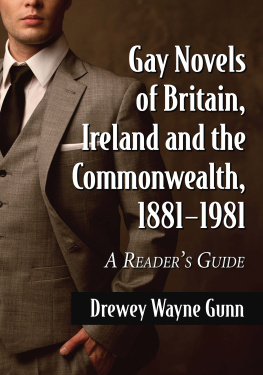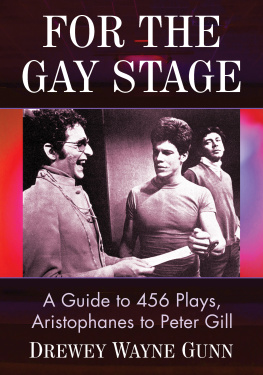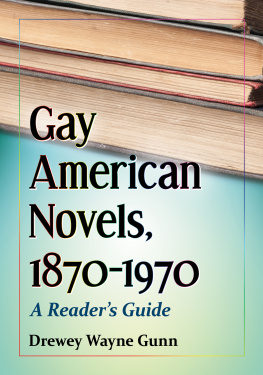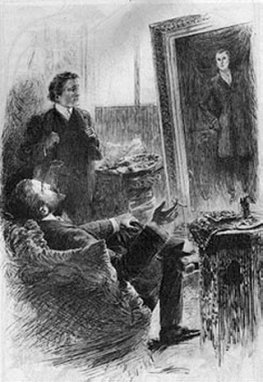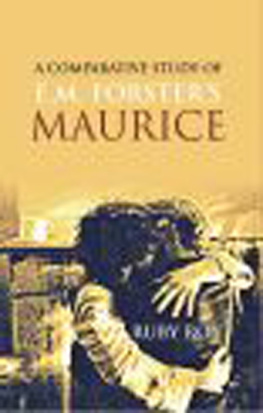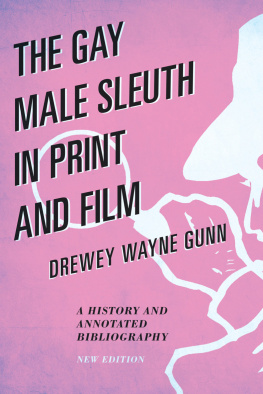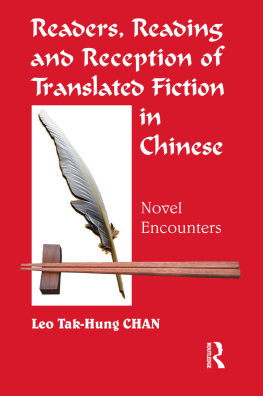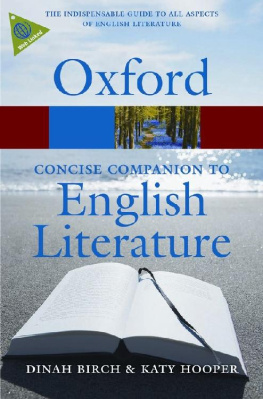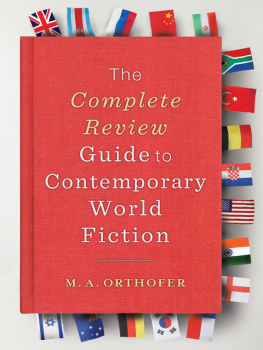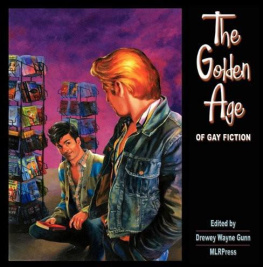
Gay Novels of Britain, Ireland and the Commonwealth,
18811981
A Readers Guide
Drewey Wayne Gunn

McFarland & Company, Inc., Publishers
Jefferson, North Carolina
LIBRARY OF CONGRESS CATALOGUING DATA ARE AVAILABLE
BRITISH LIBRARY CATALOGUING DATA ARE AVAILABLE
e-ISBN: 978-1-4766-1841-8
2014 Drewey Wayne Gunn. All rights reserved
No part of this book may be reproduced or transmitted in any form or by any means, electronic or mechanical, including photocopying or recording, or by any information storage and retrieval system, without permission in writing from the publisher.
On the cover: Man in vintage suit ( 2014 Andrejs Pidjass/iStock/Thinkstock)
McFarland & Company, Inc., Publishers
Box 611, Jefferson, North Carolina 28640
www.mcfarlandpub.com
Authors, by Entry
Sins of the Cities author
Walter Pater; A. C. Benson (as Christopher Carr); Hall Caine
Oscar Wilde
Howard Overing Sturgis
Teleny authors
Robert Hichens
A. W. Clarke; H. A. Vachell
Samuel Butler; Edward Perry Warren (as A. L. R.)
Memoirs of a Voluptuary author
Forrest Reid
E. M. Forster; Lytton Strachey
D. H. Lawrence
Rose Macaulay
Gerald Hamilton (as Patrick Weston)
Joseph Conrad
John Gambril Nicholson
E. F. Benson
Alec Waugh
Rose Allatini (as A. T. Fitzroy); John Buchan
Ronald Firbank
Ernest Raymond
Beverley Nichols
Compton Mackenzie; T. H. White (as James Aston); Norman Douglas
Kenneth Macpherson; Bryher
Rosamond Lehmann; Radclyffe Hall; Mary Butts
Sylvia Townsend Warner; Wyndham Lewis; Virginia Woolf; James Hanley; Frederick Rolfe
Ernest Milton
Evelyn Waugh
Keith Winter
William Plomer
Christopher Isherwood
Fortune Press novelists: Terence Greenidge; Richard Rumbold; Reginald Underwood; Michael Scarlott (Stanley T. Fisher); Aubrey Fowkes
Cyril Connolly
Noel Langley; Nol Coward
Seaforth Mackenzie
John Lehmann
Frank Sargeson
W. Somerset Maugham
Tom Hopkinson
Ernest Frost
Nancy Mitford; Villiers David; Pamela Hansford Johnson
Norah Lofts; Helen A. Mahler; Margaret Campbell Barnes; Alfred Duggan
Walter Baxter
Michael Meyer; Graham Greene
Desmond Stewart
Douglas Sanderson
Colin MacInnes; Hal Porter
G. F. Green
Robert Liddell; Lawrence Durrell
Angus Wilson
Rodney Garland (Adam de Hegedus)
Mary Renault.
Jocelyn Brooke
Francis King
Edith de Born; Gillian Tindall
Audrey Erskine Lindop
John Taylor
James Mitchell; John Cantwell; Michael Hastings; Colin Wilson
Kenneth Martin
C. H. B. Kitchin
Martyn Goff
Angus Heriot; Michael Nelson
Lennox Cook
Iris Murdoch
James Courage
Paul Buckland
David Caute
Simon Raven
John Rae
Hugh Ross Williamson
Arthur Calder Marshall (as William Drummond)
Gillian Freeman (as Eliot George)
Julian Mitchell
John Broderick.
Stuart Lauder (David Leslie)
Michael Power.
David Storey
Colin Spencer
Nicholas Monsarrat; Anthony Firth; Peter Leslie
Montague Haltrecht; Richard Chopping
Maurice Leitch
G. M. Glaskin (as Neville Jackson)
John McIntosh
Wole Soyinka
Desmond Cory
John Pollock
Rodney Garland (Peter de Polnay)
George Moor; Royston Ellis
Leonard Cohen; Scott Symons
Robin Maugham
Michael Campbell
Christopher Dilke
Angus Stewart
Maurice Capitanchik; Andrew McCall; Richard Green; Peter Kortner
Charles Dyer
Marc Deschamps; Jonathan Lynn
Michael Porcsa
Rupert Croft-Cooke
C. J. Bradbury Robinson
L. P. Hartley
Paul Bailey
T. C. Worsley
Susan Hill
Reginald Hill; William McIlvanney
V. S. Naipaul
Leo Madigan
Hunter Davies
Laurence Collinson; Mark Harris (Carl Ruhen); Robert Adamson and Bruce Hanford
Yulisa Amadu Maddy
Aubrey Menen
John Batchelor
Clive Murphy
Eleanor Spence; Barrie Hughes
John Bruce; Thomas Keneally
David Watmough
Eve Zaremba
Roderick Grant
David Rees
Patrick White
Frank Moorhouse
Anthony Burgess
Michael Schmidt
Julian Barnes (as Dan Kavanagh)
Roger Raftery; Lance Peters
Edward Phillips
Introduction
The title of the book sums up its scope and its goal: to provide a map, across 101 years, of longer fiction in which homosexual or bisexual males play important roles: gay novels and novellas written in English by authors associated with the British Isles and seven Commonwealth nations, regardless of the writers gender or sexuality. While this map does not chart entirely virgin territory, it blazes a trail across a landscape that has been, generally, a bit off the map, to borrow the title of a short story by Angus Wilson. In contrast to the attention paid to gay American fiction, nothing comparable has been accorded gay British or Commonwealth fiction. There have been studies of gay aspects of eighteenth and nineteenth century fiction, and a few critical works have edged towards the present, but scholars have tended to stick to the well known in their choices of texts to examine. This guide includes both canonical works and lesser known novels that deserve attention.
This survey begins with a book published in 1881. To be sure, there are homosexuals in Tobias Smolletts The Adventures of Roderick Random, 1748; John Clelands Memoirs of a Woman of Pleasure (also known as Fanny Hill), 1749; and Charlotte Cibber Charkes The History of Henry Dumont, Esq., 1756. They are, however, minor characters. (The relevant pages about their exploits are available in Mark Mitchell and David Leavitts anthology Pages Passed from Hand to Hand. Additional passages from Roderick Random appear in Byrne Fones The Columbia Anthology of Gay Literature.) One might also be tempted to ferret out closeted characters in gothic novels from Horace Walpoles The Castle of Otranto, 1765, through William Beckfords Vathek, 1816, and The Episodes of Vathek, 1912, to such later examples as Robert Louis Stevensons Strange Case of Dr. Jekyll and Mr. Hyde, 1886; Bram Stokers Dracula, 1897; and the anglicized Henry Jamess The Turn of the Screw, 1898.
One could also make a case for beginning with the narrative poem Don Leon, based on the life of Byron and published anonymously in 1866. And there are male couplings in the anonymous The Romance of Lust, 187376. So why begin with a piece of pornography, The Sins of the Cities of the Plain, or The Recollections of a Mary-Ann? For one thing, it is the first prose work I have found with an unabashedly homosexual protagonist, one who enjoys sex to the fullest (sometimes also with women) without guilt or any particular shame despite Victorian morals. Unlike Don Leon or the Romance, it has a decidedly modern tone. More: since we know that Oscar Wilde read the novel, it has links to both his sole novel and the anonymous Teleny, neither of which can be ignored. And it remains a fun, even an educational, read.
Next page
